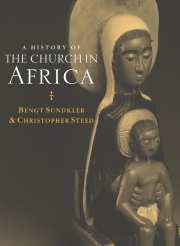Book contents
- Frontmatter
- Contents
- List of maps
- Acknowledgements
- List of abbreviations
- Introduction
- PART I THE FIRST FOURTEEN HUNDRED YEARS
- PART II THE MIDDLE AGES 1415 – 1787
- PART III THE LONG NINETEENTH CENTURY 1787 – 1919
- PART IV THE COLONIAL EXPERIENCE 1920 – 1959
- 11 Continental Panoramas
- 12 Local Perspectives
- 13 North and North-Eastern Africa
- 14 West Africa
- 15 Central Africa
- 16 Southern Africa
- 17 Eastern Africa
- PART V INDEPENDENT AFRICA 1960 – 92
- Notes
- Bibliography
- Name index
- Subject index
12 - Local Perspectives
from PART IV - THE COLONIAL EXPERIENCE 1920 – 1959
Published online by Cambridge University Press: 16 September 2009
- Frontmatter
- Contents
- List of maps
- Acknowledgements
- List of abbreviations
- Introduction
- PART I THE FIRST FOURTEEN HUNDRED YEARS
- PART II THE MIDDLE AGES 1415 – 1787
- PART III THE LONG NINETEENTH CENTURY 1787 – 1919
- PART IV THE COLONIAL EXPERIENCE 1920 – 1959
- 11 Continental Panoramas
- 12 Local Perspectives
- 13 North and North-Eastern Africa
- 14 West Africa
- 15 Central Africa
- 16 Southern Africa
- 17 Eastern Africa
- PART V INDEPENDENT AFRICA 1960 – 92
- Notes
- Bibliography
- Name index
- Subject index
Summary
CATECHISTS AND CATECHUMENS
The catechist
Representative voices bear witness to the role played by catechists in the rapid advance of the Church in this period. ‘The village catechist, with his slender qualifications and very modest pay, is the real hero of the Christian situation in Africa’. A revival in southern Cameroon in 1937 resulted in the opening of four Presbyterian catechist schools, with two-year courses. The men trained there formed the backbone of the Church for a whole generation, doing all the pastoral work except the administration of the sacraments. Catechists played a role in another Presbyterian Church, the Mission Philafricaine in southern Angola. There were two kinds of catechists: those with four to six months' training ‘but not ordained’, and those with three years' training who were ‘ordained as evangelists’. In this Church all the pastors came from this latter category, having been catechists and evangelists, with one year's additional pastoral training beyond their evangelist schooling. In the local communities, catechists were still regarded as leaders.
For twenty-nine days in every month, these communities are looked after by a teacher, who is already fully occupied in running the school, or by a catechist, who may not always have been very well instructed himself. Apart from the small amount of attention that a priest can give on his monthly visits, the entire work of teaching catechumens, confirmation candidates, first communion classes and penitents' classes is done by the teacher or catechist.
- Type
- Chapter
- Information
- A History of the Church in Africa , pp. 659 - 685Publisher: Cambridge University PressPrint publication year: 2000



